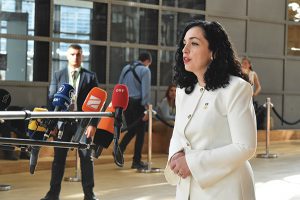Bloomberg
Kosovo agreed to postpone a plan to make government-issued identification cards and car plates mandatory for all residents after members of its restive Serb minority blockaded roads in protest.
Kosovo, which declared independence from Serbia in 2008, delayed the planned rule until September 1 rather than imposing it on Monday as originally planned. Nato’s peace-keeping mission in the former Serbian province, KFOR, said it was “prepared to intervene if stability is jeopardized.â€
The flareup underscores the lingering tensions between the neighbors. Both aspire to join the European Union, which has made a resolution to the standoff a condition for accession.
Some 100,000 Serbs live in Kosovo, which has a predominantly ethnic Albanian population of 1.8 million.
Kosovo’s government blamed authorities in Belgrade for instigating the unrest, the worst since October when a series of raids on Serbian-owned shops triggered protests. Barricades will be removed and “full freedom of movement will be established on all roads in the north of Kosovo,†the government in Prishtina said in an emailed statement.
Serbian President Aleksandar Vucic, who has condemned Kosovo’s move as unilateral action that should be addressed in talks, called on international negotiators to help restore peace. But he struck a defiant note, saying that the minority population won’t back down.
“No matter how hard it is, there’ll be no surrender, Serbia will prevail,†he said in Belgrade after meeting with his army chiefs.
Most roads in northern Kosovo along the border with Serbia, home to the biggest remaining Serb community, remained blocked early Monday, following late-night efforts by Western diplomats to prevent an escalation, Koha newspaper reported, citing local police chief Besim Hoti.
Kosovo Prime Minister Albin Kurti has insisted that rules must be respected by all residents, including members of the Serb minority who want to keep ties with the government in Belgrade and retain documents issued by Serbia.
Kurti said international mediators had helped push off the data to make documents mandatory, singling out the efforts of the US ambassador.
The EU envoy for the Balkan dispute, Miroslav Lajcak, welcomed the postponement, saying it will give time for all sides to reconvene for more talks.
The former Serbian province declared independence almost a decade after North Atlantic Treaty Organization bombing halted a 1998-99 military campaign by Serbian troops against Kosovo Albanian separatists.
Serbia and Kosovo have made little progress in their EU-brokered talks to mend ties. Russia and China have sided with Serbia in challenging Kosovo’s sovereignty and preventing it from joining the United Nations. Five EU member states have not recognized Kosovo’s sovereignty.
Russia has been a vocal supporter of Serbia, vigorously opposing Nato’s bombing campaign, while President Vladimir Putin has alternately questioned Kosovo’s sovereignty and drawn parallels between the region and two Russian-backed separatists regions in Ukraine’s eastern Donbas region.
Dmitry Peskov, Putin’s chief spokesman, called the mandatory order on IDs an “absolutely ungrounded demand†in a conference call with reporters, as he reiterated the Kremlin’s support for the Serb minority.
 The Gulf Time Newspaper One of the finest business newspapers in the UAE brought to you by our professional writers and editors.
The Gulf Time Newspaper One of the finest business newspapers in the UAE brought to you by our professional writers and editors.
